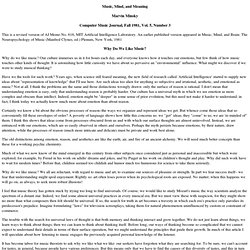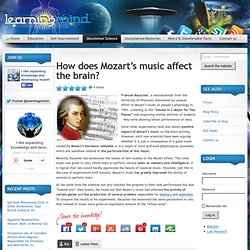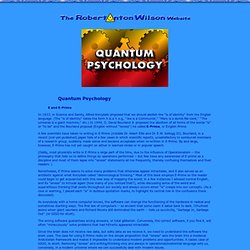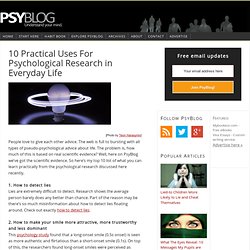

Music, Mind, and Meaning. This is a revised version of AI Memo No. 616, MIT Artificial Intelligence Laboratory.

An earlier published version appeared in Music, Mind, and Brain: The Neuropsychology of Music (Manfred Clynes, ed.) Plenum, New York, 1981 Why Do We Like Music? Why do we like music? Our culture immerses us in it for hours each day, and everyone knows how it touches our emotions, but few think of how music touches other kinds of thought. Have we the tools for such work? Certainly we know a bit about the obvious processes of reason–the ways we organize and represent ideas we get. The old distinctions among emotion, reason, and aesthetics are like the earth, air, and fire of an ancient alchemy. Much of what we now know of the mind emerged in this century from other subjects once considered just as personal and inaccessible but which were explored, for example, by Freud in his work on adults' dreams and jokes, and by Piaget in his work on children's thought and play.
Why do we like music? How does Mozart's music affect the brain? Frances Rauscher, a neuroscientist from the University of Wisconsin discovered an unusual effect of Mozart’s music on people’s physiology in 1993.

Listening to the “Sonata in C Major for Two Pianos” was improving mental abilities of students – they were showing better performance on tests. Some other experiments have also shown positive impact of Mozart’s music on the brain activity. However, until now scientists have been arguing whether it is just a consequence of a good mood caused by Mozart’s harmonic melodies or is a result of more profound physiological processes, which are somehow related to the particularities of this music. Recently Rauscher has announced the results of new studies on the Mozart effect.
This time music was given to rats, which were to perform various tasks on memory and intelligence. At the same time the scientist not only checked the progress in their task performance but also “looked into” their brains. The following two tabs change content below. Quantum Psychology. Quantum Psychology E and E-Prime In 1933, in Science and Sanity, Alfred Korzybski proposed that we should abolish the "is of identity" from the English language.

(The "is of identity" takes the form X is a Y. e.g., "Joe is a Communist," "Mary is a dumb file-clerk," "The universe is a giant machine," etc.) In 1949, D. David Bourland Jr. proposed the abolition of all forms of the words "is" or "to be" and the Bourland proposal (English without "isness") he called E-Prime, or English-Prime. A few scientists have taken to writing in E-Prime (notable Dr. (Oddly, most physicists write in E-Prime a large part of the time, due to the influence of Operationalism -- the philosophy that tells us to define things by operations performed -- but few have any awareness of E-prime as a discipline and most of them lapse into "isness" statements all too frequently, thereby confusing themselves and their readers. ) The wrong software guarantees wrong answers, or total gibberish. Trivial? Exercises. Biological Rhythms as a Basis for Mood Disorders. 10 Practical Uses For Psychological Research in Everyday Life.
People love to give each other advice.

The web is full to bursting with all types of pseudo-psychological advice about life. The problem is, how much of this is based on real scientific evidence? Well, here on PsyBlog we’ve got the scientific evidence. So here’s my top 10 list of what you can learn practically from the psychological research discussed here recently. 1. 2. 3. 4. 5. 6. 7. 8. An Essay by Einstein. "How strange is the lot of us mortals!

Each of us is here for a brief sojourn; for what purpose he knows not, though he sometimes thinks he senses it. But without deeper reflection one knows from daily life that one exists for other people -- first of all for those upon whose smiles and well-being our own happiness is wholly dependent, and then for the many, unknown to us, to whose destinies we are bound by the ties of sympathy. A hundred times every day I remind myself that my inner and outer life are based on the labors of other men, living and dead, and that I must exert myself in order to give in the same measure as I have received and am still receiving... "I have never looked upon ease and happiness as ends in themselves -- this critical basis I call the ideal of a pigsty. The ideals that have lighted my way, and time after time have given me new courage to face life cheerfully, have been Kindness, Beauty, and Truth.
"My political ideal is democracy. Review and Criticisms of Attachment Theory. Generalized Interpersonal Theory.